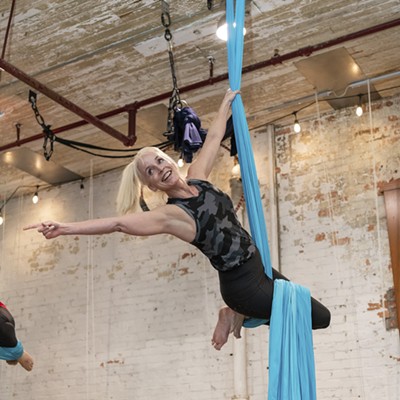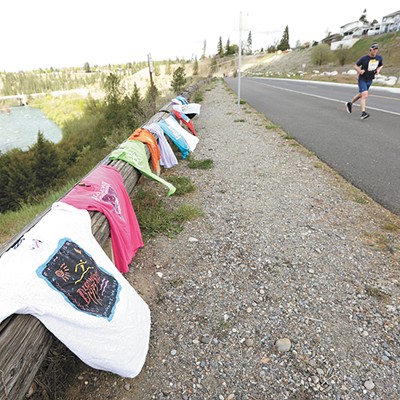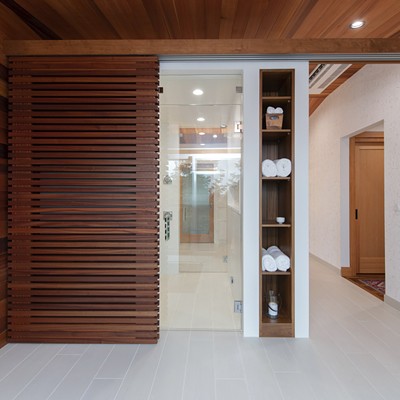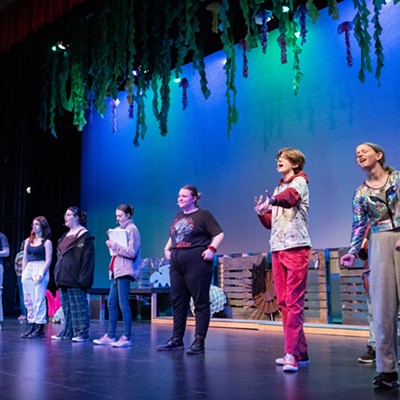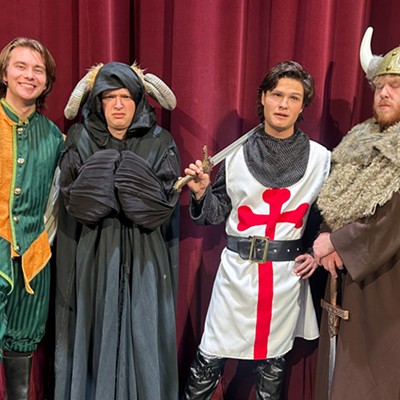The inside of Farmgirlfit is not, as you might be tempted to think, strewn with hay bales. There are no fences to hop, no scarecrows to hurl or kick, no tractors to tow with thick rope. In fact, given its austere purple and gray color scheme, it looks a lot like any other contemporary gym, replete with rowing machines and pull-up bars. On the wall there's a whiteboard with a list of names and ascending times next to them. And then, yes, almost tucked away in the corner, some giant tractor tires.
All that familiarity is misleading, though. Farmgirlfit is a deliberately different exercise regimen, or rather, a different approach to exercise in general. Because it's designed by women exclusively for women, it offers an alternative to the common style of crossfit training that tends to be geared — both physically and psychologically — toward men. That's because military-style training informs a lot of crossfit workouts. As a result, crossfit can either place too much emphasis on weights, thereby overtaxing women, or it can be too timid when it comes to female weight training.
"The personalities that are attracted to [crossfit] tend to be more intense," says Jaunessa Walsh, who co-owns Farmgirlfit with fellow Gonzaga alumna Jenni Niemann. "More men seek out weightlifting, whereas women want to change up what they're doing. They look more for pilates, or now barre (ballet-inspired workouts) is the big phrase, or BodyPump. Women just don't naturally gravitate towards weights as much."
With this basic difference in mind, back in 2011 Walsh and Niemann set about designing a fitness program that catered to women and their practical exercise needs. The pair aimed "to focus on quality of life," rather than "gimmicky devices" or fitness for fitness' sake, which ultimately translates to "being able to do the things you want to do: keeping up with your kids, your grandkids, being able to stand up without having to heave off your chair," Walsh says.
"The name Farmgirlfit came from the idea of getting back to basics. Jenni grew up on a farm in Oregon, and a lot of people who grew up in rural communities were fit because they had to be," Walsh explains. "Our lifestyle doesn't necessarily require that, but that doesn't mean we can't work towards it."
The regimen they've designed is split into segments called The Grind, supplemented by an optional high-energy workout called Volt:30. The Grind has four variants for different days of the week, and each one has four different levels to accommodate varying fitness abilities. What they all have in common is that they try to allow each woman to work at her own pace, and they're a holistic, rather than a targeted, form of exercise.
"There are different ways to work out if you're looking to bulk up, versus if you're trying to be strong but leaner," Walsh says. "We've tried to take this model of high-intensity interval training" — or HIIT, as it's commonly abbreviated — "using full-body range of motion. So we don't isolate muscle groups. We do movements that work the whole body and are more core- (or middle-body) centric. We try to take that style and bring it to women in a way that is achievable for them, but also challenging."
For all their planning, however, Walsh and Niemann were surprised by the type of women who became regulars.
"When we started, given the ages that Jenni and I were, we thought it was going to be younger women. It's really been a slightly older demographic, a lot of younger moms who have school-aged kids. They want to refocus on themselves." Which isn't to say that Farmgirlfit limits itself to those age ranges. "We do have quite a few women above 50, above 60, who've had tremendous results."
Across the breadth of its participants, the testimonials have been glowing and consistent. What Farmgirlfit members cite isn't just the quality of the workout itself, but the inspiration and encouragement that strengthens their resolve.
"They know when they walk in the door it's going to be a tough workout," says Walsh. "They're going to have to work hard. But if you do, you're going to get the results that you want. And we've built it in a way that you can get there." ♦






